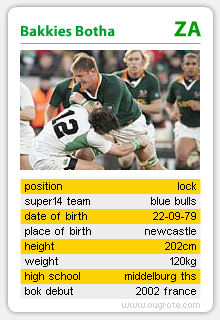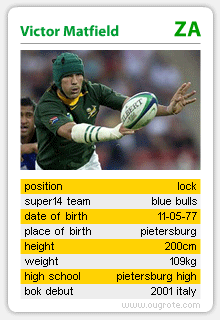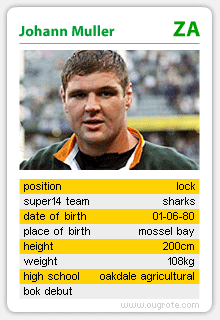Winning the World Cup will require a rugged lock in the engine room writes Hamish McBrearty for Sportingo.
“Clinical fly-halves or speedy wingers are ineffective without a rugged man in the engine room. So which locks should we be looking out for in France?
When fans think of game-breaking players, they generally think of silky fly-halves controlling the tempo or of speedy wingers sprinting down the flanks. But winning the World Cup will require a rugged lock in the engine room as well.
Previous World Cup winners have boasted such great locks as Gary Whetton, John Eales and Martin Johnson. While these players were never considered stars of the tournaments they played in, they provided leadership and the power up front to allow their teams to excel.
This year’s tournament features some of the biggest and most athletic locks ever to play the game, and while none will compete for player of the tournament, each will make a huge contribution to his team’s chances.
The All Blacks could have gone into this tournament with a formidable locking corps, but season-ending injuries to James Ryan and Jason Eaton, as well as lesser knocks to Ali Williams and Keith Robinson, have depleted their depth at this crucial position. Both Williams and Robinson will make the trip to France, but neither has had a great deal of game time of late.
One locking spot will undoubtedly belong to Chris Jack, the 62-Test veteran is one of the most dominant line-out forwards in the world. A towering man, Jack is also extremely mobile and when he is not competing in the air, he is often seen running with the ball in hand like a 2.02m (6ft 8”) back.
If the All Blacks’ locking stocks are strong, the Springboks are iron-clad. Victor Matfield and Bakkies Botha are two of the best in their position, able to disrupt and even win opposition line-out throws regularly as well as imposing their powerful presence at the breakdown. Behind these two players are Johann Muller, who has captained the Springboks, and Albert van den Berg, who would be a first choice lock in just about any other team.




When John Eales retired, it left a huge hole in the Australian pack with no obvious heir apparent, until Nathan Sharpe finally lived up to the potential he had shown for so many years. Not only is he a dominating and fast player, being captain of the Western Force has also moulded him into an excellent leader. If the Wallabies have a weakness in their pack it is their second lock. Dan Vickerman, Hugh McMeniman and James Horwill have not truly proven themselves at international level and their lack of big-match experience could cost their team in the knock-out phase.
Ireland also boast a world class lock in Malcolm O’Kelly. A giant of a man at 2.03m (6ft 8in), he has been troubled by injuries but still managed to make 85 appearances in the green shirt. If Ireland are to compete with the Southern Hemisphere teams, they will need O’Kelly and fly-half Ronan O’Gara at their best, but with the mountains of experience both men have, it is a very real possibility.
When talking about world-class locks, it is also hard to go past France’s Fabien Pelous. Forced to relinquish the captaincy due to injury, Pelous is the unofficial vice-captain of Les Bleus and will provide a great deal of inspiration to his team. He also has a wealth of experience, having played 110 Tests and will become France’s most capped player of all time with just two more.
While the flashy backs may make the highlight reels, it is the forwards who set the platform which allows the backs to showcase their skills, and a top lock goes a long way to setting that platform. The fly-halves may be the key to World Cup glory, but a key is no good without a lock, and there will be plenty of good ones on show.â€
by Hamish McBrearty for Sportingo
Read the original story here:
http://www.sportingo.com/rugby/from_jack_matfield_okelly_pelous/1001,4210

Good to see the big men in the engine room getting the respect they deserve